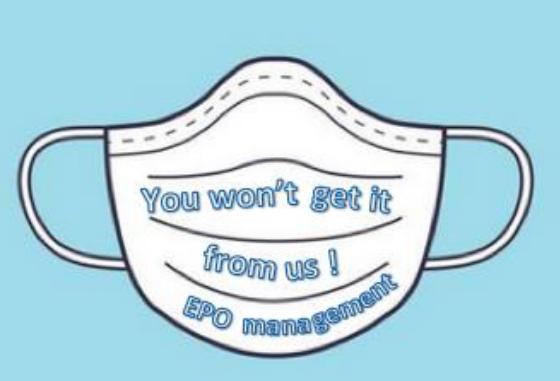

THE management of the EPO belittled the crisis. This is no secret. We still routinely see an unmasked António Campinos sitting next to colleagues. They proudly advertise photos of such violations. But just like Benoît Battistelli, Campinos is exempted from the law. Nobody will be arrested at the EPO, but 'bad' judges will be dragged out of their offices if the Office President doesn't like them. If, for example, they speak out about corruption...
 This is no joking matter. We've written a great deal about the seriousness of this virus, which is having a 'second go' at Europe and is arguably outpacing the so-called 'First Wave', in some countries more than in others.
This is no joking matter. We've written a great deal about the seriousness of this virus, which is having a 'second go' at Europe and is arguably outpacing the so-called 'First Wave', in some countries more than in others.
"Nobody will be arrested at the EPO, but 'bad' judges will be dragged out of their offices if the Office President doesn't like them."This brings us to today's disclosure of an internal document, composed by actual scientists who actually do work for the Office (not doing Webchats on premises of the Office for lousy, self-promotional photos ops in the EPO's Web site).
Here is what the Central Staff Committee published just under 6 months ago, noting that "the President announces that in the near future Office occupancy will be capped at some low level (20% to 50%) by massively using teleworking. Beyond possible issues with the Contracting States, this de facto constitute an implicit departure from Article 55a(1) ServRegs providing that employees shall normally perform their work on the Office's premises. Consultation in the COHSEC and the GCC is a must."
"In addition," they noted, "you should be aware that the Office has objectively more interest in pushing you into “voluntary” rather than “mandatory” teleworking because it can more easily shift the responsibility and operational risk onto your shoulders, including the risk and consequences of not reaching set objectives."
Here is the full publication in HTML form:
Munich 20.05.2020 sc20086cp
Gradual return to EPO buildings
Dear colleagues,
On 11 May 2020 the President made an announcement informing us of a gradual return to EPO buildings. A few days later a further announcement described which concrete measures would be introduced to ensure a safe return.
We have already published a paper (“Working from home in times of Coronavirus”) which explains some basic principles concerning the relationship between an employer and its employees. As the Office appears to be now entering a new phase of working we think it is now time to revisit these principles.
The Office’s premises
Firstly, the Office is not a workplace like any other, be it a private company or even another International Organisation. It has been established within the framework of the EPC to take over from national patent offices the task of granting European patents, i.e. bundles of national patents, for the Contracting States1. To that effect, the states have decided that those tasks should normally be performed by civil servants on the Office’s premises. The introduction of large-scale teleworking would seem to question the validity of this, all the more so if staff are working in locations outside the host countries. In our view, the Contracting States must discuss any fundamental departure from this basic understanding2.
Article 55a(1) ServRegs3 codifies the above and directly regulates your working conditions. Moreover, it is a safe bet that when you took up your official duties you assumed that you would be predominantly working on the Office’s premises.
Now, the President announces that in the near future Office occupancy will be capped at some low level (20% to 50%). This may be justified with duty of care. However, this does not change anything to the fact that you will be instructed to work predominantly at a location other than the Office's premises. This is a back-door change to your conditions of
_____ 1 See e.g. Articles 2 and 4 EPC 2 See Article 33 EPC (and possibly Article 172 EPC) 3 Article 55a(1) ServRegs: “Permanent employees in active employment shall normally perform their work on the Office's premises.”
employment disguised as a sanitary measure, for which statutory consultation is mandatory4.
To wrap it up, the announced measures de facto constitute an implicit departure from the statutory provision of Article 55a(1) ServRegs. Consultation in the COHSEC and the GCC is a must. Failing this, all negative consequences directly deriving from the changes will be illegal.
We think it is high time now for the President to cease ignoring our repeated requests for involvement and consultation.
“Mandatory” teleworking vs ”voluntary” teleworking
You might have the impression that management has been trying to make you forget that working on Office premises is the default option, for which you do not need any authorisation since the President has never closed them5. Teleworking has been presented as a possibility generously proposed to you on an individual basis. The scheme was probably so widely successful until now for reasons linked to the pandemic surge, e.g. because so many staff members had to stay home to take care of small children or relatives.
The initial attractiveness of the scheme will probably wear out. Staff will feel the need to come more often to the Office and line management will have to make decisions, resorting to issuing “instructions to work from home again” or “strongly urging” their staff to do so.
Until now the Office has consistently blurred the distinction between mandatory and voluntary teleworking, with a clear preference for the latter as it has been announced that “mandatory” teleworking should only apply to three very limited medical indications.
As explained in our first paper, “mandatory” teleworking means that you have been forced, or “strongly urged” to work from home. Because the relationship between the Office and you is based on mutual trust and good faith, you are then expected to take reasonable measures, or make “best efforts”, to try to mitigate the consequences of the order to stay home. Nothing more, nothing less. In particular, the order does not commit you to reaching the objectives set by management.
Conversely, “voluntary” teleworking means that you have still the right to come to the premises. It is convenient for the Office in that it can more easily shift the responsibility and operational risk onto your shoulders, including the risk and consequences of not reaching set objectives. Some directors in DG1 have already instructed their line managers to “hold discussions” with those having a productivity level below that planned
_____ 4 See also Article 55a(2) ServRegs: “The President of the Office may, after consulting the relevant joint committee, establish implementing instructions allowing employees to perform their duties at a location other than the Office's premises.” 5 Of course the President could forbid you to come on its premises, either on an individual basis or on a collective basis. You are then obliged to obey this injunction. In the House Rules: “The right to grant or refuse access to the premises is exercised by the President and those to whom the President has delegated this authority, in particular the site managers and security staff.”
before the pandemic. No doubt that this will also play a role when line management assesses your performance for 2020.
In conclusion, you should be aware that the Office has objectively more interest in pushing you into “voluntary” rather than mandatory teleworking. If you believe that your teleworking is not actually “voluntary”, you must insist on receiving clear written instructions from your line management (e.g. an instruction to work from home or a formal prohibition to access the Office’s premises)6.
Some concrete measures
Most of the announced concrete measures appear reasonable. However, two should be singled out for comment.
- The President has announced that “each staff member is responsible for providing their own mask”. This is petty-minded and illegal, because the employer is legally obliged to provide masks in order to discharge its duty of care. In addition, it also appears reasonable from a hygienic viewpoint to avoid the proliferation in the Office of different masks of uncontrolled provenance and uncertain protective effect. Deciding which type of mask to wear should not be the responsibility of individual staff members.
We therefore recommend that you contact Health & Safety (H&S) to obtain a mask if you need one, as advocated in the announcement. It appears that H&S has been instructed to provide masks only “if you are asked by your line manager to come to work at EPO premises”7. We recall that you are entitled to come to work unless you are on mandatory teleworking.
- The President has announced the completion of a mandatory e-learning course as a precondition for coming to the Office premises. In view of the obvious importance of this module, we suggest that it should be available in all three official languages.
Stay healthy.
The Central Staff Committee
_____ 6 See Article 20(2) ServRegs: 7 Management argues that there is no need for the Office to provide masks, as staff is not forced to come back to the Office!